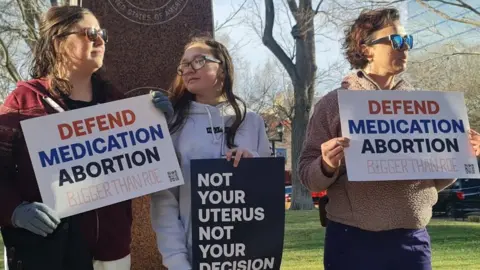Texas abortion pill ruling poses threat to other drugs
 AFP
AFPApproval of practically every drug in the US could be undermined by a Texas court's recent ruling on abortion pills, which experts say threatens the country's entire regulatory structure.
Last Friday, a judge in Texas revoked the Food and Drug Administration's approval of mifepristone, the first of two drugs used for medication abortions.
Legal experts fear the ruling opens the door for challenges to other approved medicines in the US and could also stifle development of future drugs.
"This could have precedential value that could apply well beyond abortion medication to standard drugs that the FDA is constantly reviewing," said Lawrence Gostin, a professor of global health law at Georgetown University.
The Justice Department has since appealed against the decision, which Biden Administration officials have said could upend the FDA's entire approval process.
In his 8 April ruling, Texas Judge Matthew Kacsmaryk ordered pulling mifepristone from the market in seven days time, saying the FDA had violated federal rules that allow for accelerated approval of some drugs. The order is set to take effect on Friday.
"FDA acquiesced on its legitimate safety concerns—in violation of its statutory duty—based on plainly unsound reasoning and studies that did not support its conclusions," the judge wrote in his 67-page opinion.
Anti-abortion campaigners who have opposed mifepristone's FDA approval alleged that agency made a politically-motivated decision in approving the drug, and said it did not follow proper protocols.
Legal analysts, meanwhile, have called the Texas ruling deeply flawed, arguing it cherry picks evidence and is replete with partisan terminology, including references to "unborn humans" in place of the word foetus.
"I view the decision as more of an ideological or religious tract masquerading as a judicial opinion," said Scott Lassman, a lawyer with over 30 years of experience in FDA law and policy.
The Food, Drug and Cosmetic Act of 1938 gives the FDA the authority to determine whether drugs are safe and effective, and typically, courts have deferred to the agency when it comes to scientific and medical decision-making, Mr Lassman said.
Mifepristone in particular has an "impeccable" health and safety record and has gone through rigorous FDA evaluation, said Mr Gostin of Georgetown University.
Experts say common health procedures like colonoscopies have higher complication and death rates, as do drugs like penicillin and Viagra.
But Judge Kacsmaryk's ruling sets a precedent that any non-medically trained individual could challenge that type of scientific evidence, experts said.
"It's a slippery slope to try to second-guess the scientific judgments of career FDA scientists," said Mr Gostin.
This week more than 300 pharmaceutical executives called for the Texas decision to be reversed, arguing it disregarded scientific evidence.
The pharmaceutical industry could be wary of more legal challenges to their products, particularly treatments that have become political flashpoints in the US, like gender-affirming care and Covid-19 vaccines, said I Glenn Cohen, a Harvard Law School professor.
"It's possible in any space, but … it's going to trickle down in some ways and play out to be the worst for drugs that are needed sometimes by discrete and insular minorities," he said.
Experts argue those seeking to challenge politically controversial treatments might seek to file suit again in Judge Kacsmaryk's Amarillo, Texas district.
"It looks like this judge has very strong ideological and religious beliefs that may make him the perfect venue to challenge those more politically charged types of drug approvals," said Mr Lassman.
Consequences could also extend beyond the FDA, affecting the ability of other US regulatory agencies, such as the Environmental Protection Agency and the US Centers for Disease Control and Prevention, to make scientifically informed decisions to protect Americans' health, legal experts said.
"If they're unable to use the very best scientific evidence, then America is going to be far less safe and far less healthy," Mr Gostin said.
